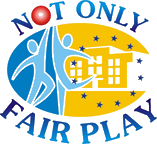
- Home
- Best
Practices - Toolkits
How to ... - Sport
Events - Guidelines
- Information
& Contacts - Project Management
A collection of student stories and initiatives about sport.
This section offers access to a collection of toolkits to promote sport at school.
-
 Physical Education Teachers
They are the main point of reference for students at school
Physical Education Teachers
They are the main point of reference for students at school
-
 Teachers
Teachers of all subjects can contribute to promote sport at school
Teachers
Teachers of all subjects can contribute to promote sport at school
-
 School Directors
Their support is a key element to promote sport at school
School Directors
Their support is a key element to promote sport at school
-
 Resources
A database of resources for teachers, PE teachers and school directors for the promotion of sport at school.
Resources
A database of resources for teachers, PE teachers and school directors for the promotion of sport at school.
Sporting events are organised in each partner country
Guidelines for policy makers willing to raise awareness on the importance of promoting sport in schools
Events
The Not Only Fair Play project has been promoted through conferences and articles.
Partnership
-
 Contractual Partners
From this section it is possible to access a description of each contractual partner of the Not Only Fair Play project.
Contractual Partners
From this section it is possible to access a description of each contractual partner of the Not Only Fair Play project.
-
 Schools
From this section it is possible to access information about the schools involved in the Not Only Fair Play Project in the 9 European countries involved.
Schools
From this section it is possible to access information about the schools involved in the Not Only Fair Play Project in the 9 European countries involved.
-
 Associated Partners
A number of associated partners officially joined the project in order to ensure the project sustainability by continuing to use the project deliverables over the next years.
Associated Partners
A number of associated partners officially joined the project in order to ensure the project sustainability by continuing to use the project deliverables over the next years.
This section of the Not Only Fair Play portal provides administrative information for the project contractual partners and for the European Commission, and is password protected.
Physical Education Teachers
Homepage > Toolkits > Physical Education Teachers

They are the main point of reference for students at school
Back to the Physical Education Teachers Toolkits
Sport as a Mean of Social Inclusion, Including Communication Strategies with Parents
A Toolkit for Physical Education Teacher
Schools, under the management of Physical Education teachers, should organize conferences for children and parents to explain the importance of sport. But in order to appeal each and everyone of them, the idea is to invite famous athletes who could talk about their experiences, their story. Fame might be a way to involve parents and children in sporting activities”.
- “Sport and…”This website talks about different subjects such as “sport and health”, “sport and education”, sport and crime prevention”. All of these subjects could help the athletes to talk about them.
- Parent InvolvementThis website contains a checklist to evaluate and improve parent-school partnerships.
- The role of Special Olympics in promoting social inclusion: An examination of stakeholder perceptionsThis shows the importance to see sport as a mean of social inclusion.
- Parent EngagementThis web site contains strategies for involving parents in school health and some examples of ways school staff can connect with parents.


